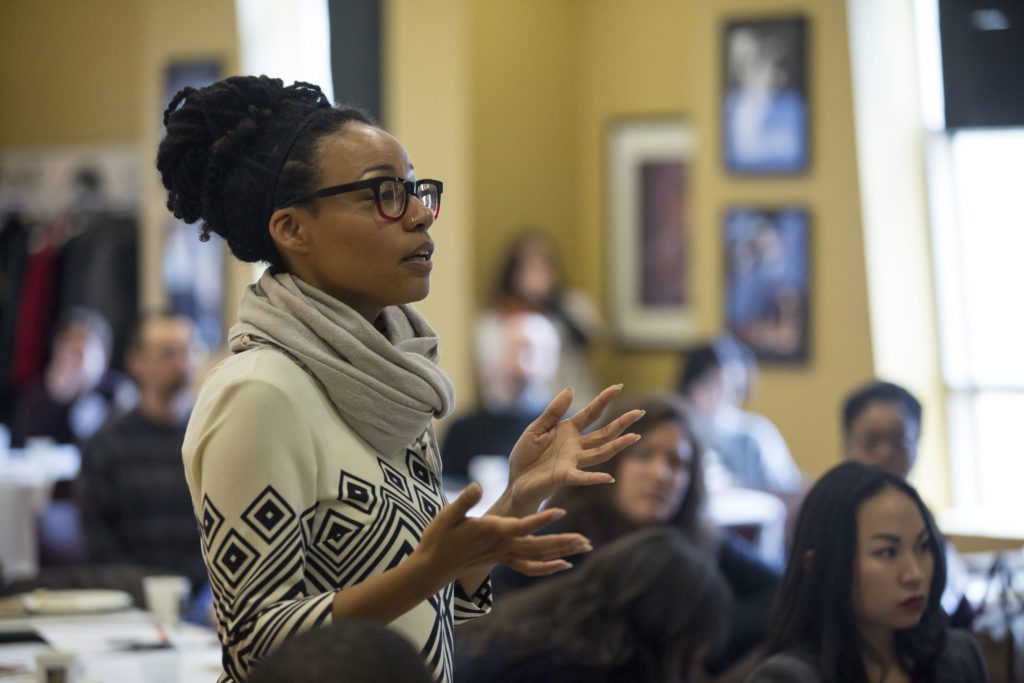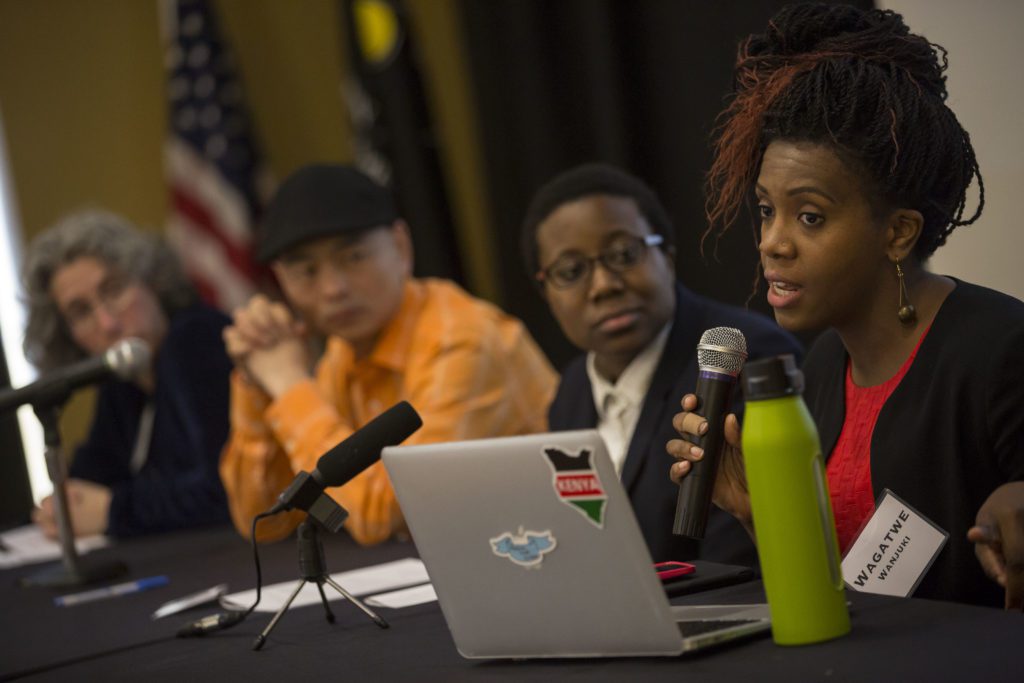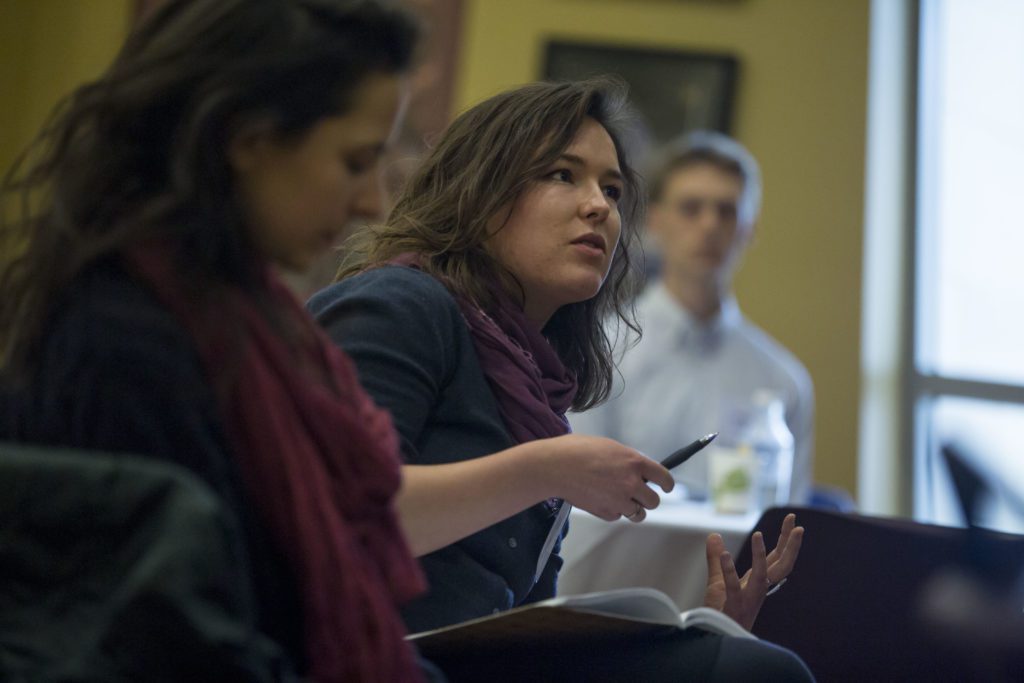Pleasure & Danger: Sexual Freedom and Feminism Now

2015 Women’s History Month Symposium
Cabral Center
March 20, 2015
View the full program for the day, including speaker bios and panel abstracts, here.
Sponsored by The WGSS program, The Forum on Feminist Thought, The Feminist Theory 2.0 collaborative research cluster, and The Humanities Center and co-sponsored by the School of Law and the Departments of Communication Studies, English, History, Philosophy & Religion, Political Science, and Sociology & Anthropology

WGSS visiting scholar Juli Grigsby, who was also a panelist at the event, asks a question 
Panelist Wagatwe Wanjuki (Writer & Activist) addresses the audience 
Students in the audience at “Pleasure and Danger”
At the heart of the feminist project is a persistent concern with thinking through the “powers of desire” (Snitow, Stansell, and Thompson 1983) and expanding the potential for sexual and gender freedom and self-determination at the same time that we combat sadly persistent forms of sexual danger and violence. Exemplified in the US context by Carole Vance’s landmark collection, Pleasure and Danger: Exploring Female Sexuality, feminist debates over sex, gender, and society have been incendiary. First published in 1984, as proceedings of the infamous “Scholar and the Feminist” conference at Barnard, which initiated the equally infamous “sex wars,” this volume reproduced intense dialogue while also contributing to a much broader investigation of the politics (and pleasures, and dangers) of sexuality within feminist theory and culture. Articles that threw down gauntlets were subsequently canonized and celebrated. Much has changed since that explosive conference and book. Even the subtitle – “exploring female sexuality” – would now be more deeply interrogated (biologically female? presumptively heterosexual?) and certainly pluralized. But however reframed, the paradoxical joining that is “pleasure and danger” remains poignantly relevant.
This symposium engages transdisciplinary and transnational scholars and activists to address questions and debates provoked by the “pleasure and danger” couplet. Talks engage with the historical (have the sex wars moved to new terrain such as trafficking and slut-shaming?); the representational (how does the digital era transform our sexual lives? what does “live streaming” sexual assault do to/for feminist organizing? what possibilities are there for feminist and queer imagery in an era of prolific porn, commodified otherness, and everyday inclusion?); the structural (how do race, ethnicity, religion, and national cultures enable and constrain sexual freedoms? how do carceral and governance feminisms frame and perhaps contain earlier liberatory impulses?); and/or the intersectional (how do we analyze the mutually constituting relations of sexuality, gender, race, ethnicity, class, nationality, ability, age, and so on?). There are local and global questions to be asked and strategic arguments to be resolved. And the very terms are themselves constantly debated (whose pleasure are we speaking of and for? who is the “we” doing that speaking? who is imagined to be “in danger?” how does “gender” signify differently in that couplet from “sexuality?”)
The day-long event will feature speakers from Northeastern University and beyond, including: Moya Bailey (Northeastern University), Reina Gossett (Barnard College), Juli Grigsby (Northeastern University and Harvard University), Janet Halley (Harvard University School of Law), Chong-suk Han (Middlebury College), Kimberly Hoang (Boston College), Michael Kimmel (Stonybrook University), Cliff Leek (Stonybrook University), Aishah Shahidah Simmons (Temple University and Director, NO! The Rape Documentary), Wagatwe Wanjuki (Writer and Anti-Sexual Assault Activist), and Margot Weiss (Wesleyan University). Panels include: The Political Economy of Sex and Gender, Representing Desire, Yes Means Yes? Conceptualizing Consent, and a roundtable of all panelists to conclude the day, Pleasure and Danger: past, present and future. The day will also feature a student-activist talk-back panel over lunch.
The event was filmed by Pack Network, LLC and footage can be viewed on YouTube.